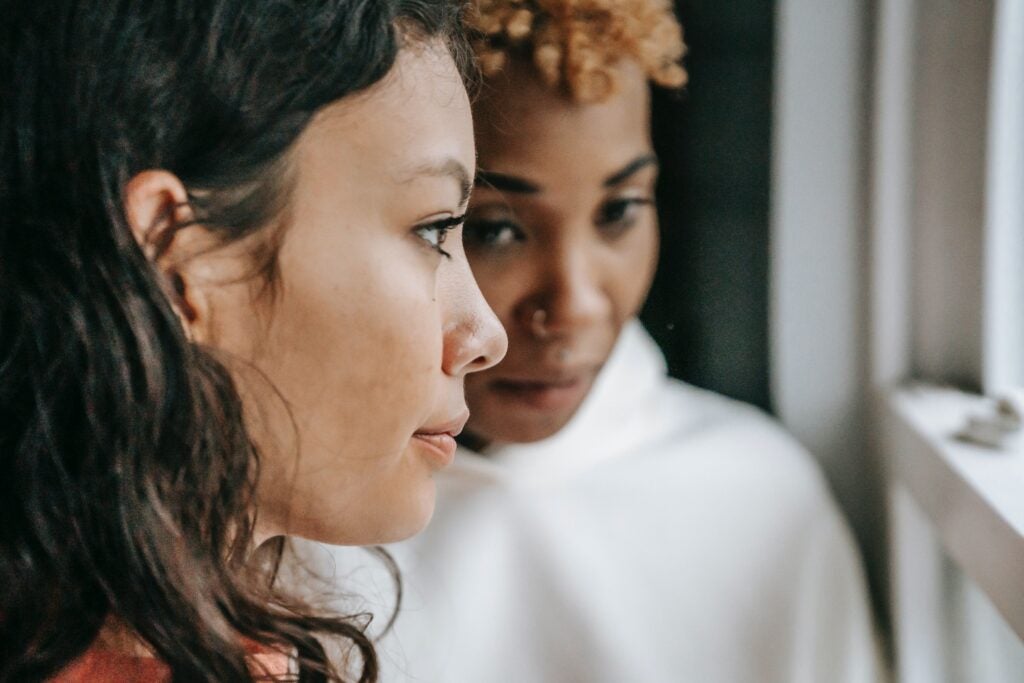
Trust can be defined as relying on the integrity, word, and promise of another individual.1 Most people would agree that trust is a vital part of a relationship. Those in romantic relationships may have noticed that trust does not always come naturally in relationships and often takes a lot of work to develop. A person must earn the trust of their significant other. In order to develop trust, each member of a relationship must prove to the other that they can be trusted. Trust evolves through experiences and develops as a relationship matures. Although earning trust may seem like more work than fun, with an understanding perspective, commitment, and effort on both ends, strong mutual trust can be achieved.
Developing Trust in Relationships

Many people become impatient, and struggle with the amount of time it takes to trust another person. People want to trust their significant other; it brings a sense of ease and comfort with the relationship. However, not all people develop trust with another person at the same rate. This is when attachment theory and past experiences come into play. According to attachment theory, people form expectations of their close relationships on the basis of their attachment histories, particularly care-giving experiences. These previous attachment relationships become working models of attachment that influence the inferences people make about their romantic partners. These individual differences of attachment are referred to as attachment styles and they affect the degree to which people trust their partners for support and their own willingness to offer support.2 Some attachment styles allow for an easier development of trust, however, you should not be discouraged if you or your partner has a less secure style of trust. Any relationship can build trust, some just need a little more patience and effort.
Past experiences in romantic, familial, and friendly relationships can impact a person’s level of trust in future relationships. You can be the most honest and faithful partner ever, but if your partner has had past experiences that involved a breach of trust, they may have a more difficult time trusting you. Once again, this does not mean that trust cannot be built, it just may require a little more work. It is important to recognize that your partner may develop trust at a faster or slower pace than you and the best way to handle it is to be understanding of these differences.
Tips to Build Trust
Building trust within a relationship is a process that involves several components. The components can evolve in steps but often work together in a larger cycle of trust. The following are some tips and guidelines to building trust:
Effective Communication
Communication is key in any relationship and vital to developing trust. Communication not only includes what you tell your partner, but also how you deliver that message and how you listen and react to your partner. Effective communication involves honesty, positive thinking, active listening and appropriate responses to what your partner has to say. Effective communication also involves compromise. There are many ways to improve communication within a relationship that can help develop deeper intimacy and trust. You can read more about effective communication here.
Honesty
It may seem simple, but people often deviate from the truth for a variety of reasons . Some lies may appear as minor “white lies,” such as not mentioning consuming a large milkshake when on a diet. Some lies are larger issues, such as downplaying how uncomfortable you feel about your partner going to a club without you. Either way, lies diverge from the truth and create a less open and honest form of communication between partners.3 People often tell white lies in order to “protect” their partner, to “avoid looking bad” or to avoid a conflict. However, frequent white lies can create a distorted reality and an environment of dishonesty that actually damages the relationship more than it protects it.4 Therefore, it benefits to always tell your partner the truth in order to create an honest, respectful relationship.
Tender Honesty

Being honest, however, does not have to equate to brutal honesty. Brutal honesty can sometimes be too aggressive and may cause hurt feelings and an argument.4 Communicating relationship issues with some kindness, rather than brutal honesty, will decrease the likelihood of someone feeling hurt or attacked and thus, improve communication between partners.4 Consistent tender honesty shapes a partner’s beliefs and predictions of his or her partner’s honesty and, in combination with an effort to understand each other’s concerns, creates a safe space to openly communicate, thus building trust.
Self-Disclosure
Self-disclosure is the act of revealing personal information about yourself. This can range from superficial information, like where you are from, to more intimate information, such as embarrassing moments and your biggest fears. Research has shown a positive correlation between self-disclosure and trust.5 By disclosing intimate information to one’s partner, a person demonstrates that he or she is gaining trust in them. The partner may realize this and respond with his or her own personal self-disclosure as well. Sometimes a person may not fully trust their partner, however, choosing to place one’s self in a risky position by revealing his or her intimate thoughts may facilitate a deeper conversation and allow for the development of trust.
Therapists suggest each partner should reveal about an equal amount and degree of intimate information to each other.6 If your partner begins to reveal more intimate information with you, you should consider revealing some more intimate information about yourself too. This will not only facilitate a deeper, more interesting conversation, but it will also help build trust. Remember not to share any personal information that your partner revealed to you in confidence.
Consider Your Partner’s Best Interests

Thinking and acting in a partner’s best interests, whether in an everyday or trust-related situation, will help to build trust. The best thing to do is be open and honest with your partner about everything, from the study session with your classmates to the party you went to with all your friends (and some strangers). The more details given about the situation, the less questioning and wondering will occur on the other partner’s end. In the context of the party example this can include the location, the attendees, who you spoke to, and how you responded to someone who tries to flirt with you, if this occurs. Because it constitutes some partners’ biggest fears, some people may feel reluctant to discuss with their partner a situation in which another person approaches and attempts to flirt with him or her. However, telling these stories allows the person to describe how he or she acted, rather than just hypothetically discussing how he or she would have acted, and thus proves his or her faithfulness, aiding in the development of trust.
Keep the little promises!
Follow through with all promises that you make, whether big or small. Keeping the little promises, such as calling when you said you would, matter a lot. To some people, small promises are made since the beginning of the relationship and successfully following through with them helps build a strong foundation for trust.6 Later on when bigger, more serious promises are made, your partner will have an easier time believing that you will follow through with them.

Concluding Remarks
The before mentioned are just a few tips to help deepen trust in a relationship. There are many ways to go about building trust and no two people interact together identically. It’s important to remember that trust can fluctuate as couples encounter various life obstacles, but if both partners demonstrate their commitment to one another and make efforts to continue to strengthen their relationship, the trust can continue to grow.6
References
- Dictionary.com. Dictionary.com, n.d. Web. 20 Jan. 2016
- Love and Attachment – SexInfo Online” Love and Attachment – Sexinfo Online. N.p., 14 March. 2014. Web. 20 Jan. 2016.
- Firestone, L. (2013). Shades of Truth: The Many Ways We Lie.
- Goldsmith, B. (2014). Honesty Can Make or Break a Relationship.
- Keller, Kristine. “Disclose Yourself.” Psychology Today. N.p., 12 Aug. 2011. Web. 20 Jan. 2016.
- Morris, C. (2013). Build a Stronger Relationship: 10 Tips to Deepen Trust. Retrieved June 2, 2015.
Last Updated: 24 January 2019.
